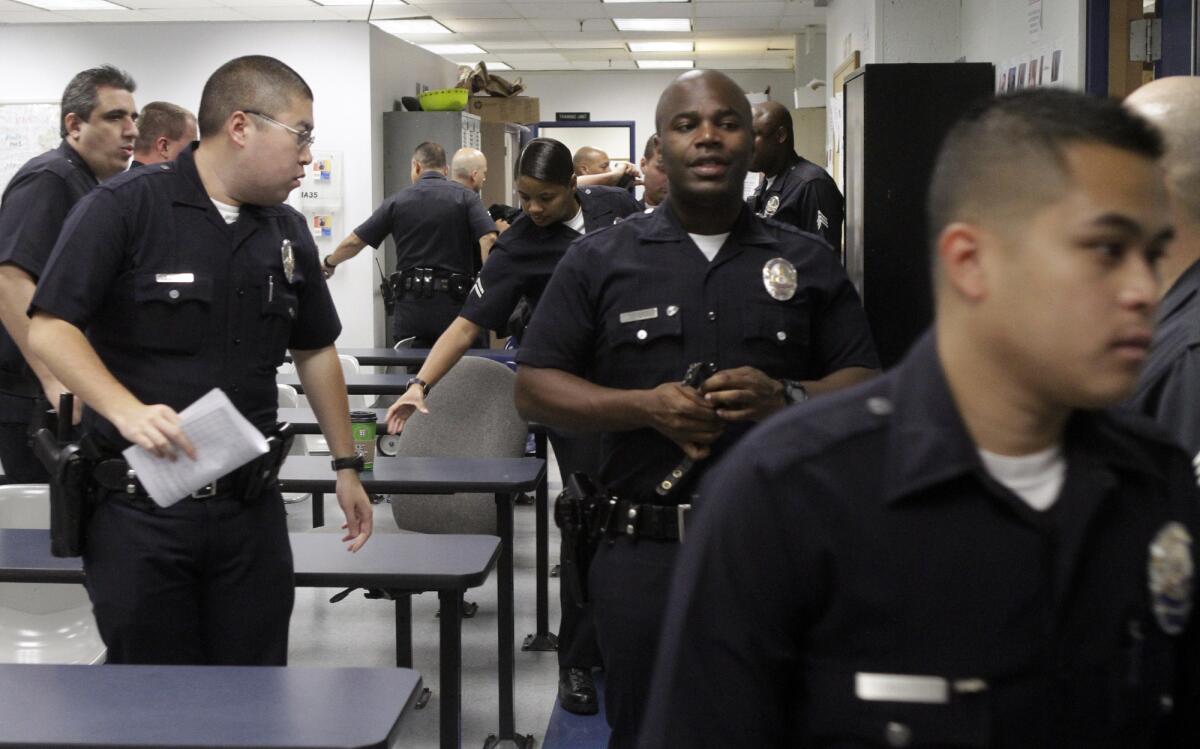California bill would make it harder to punish police officers who have been accused of lying

Reporting from Sacramento â It would be more difficult for police departments in California to discipline officers accused of lying under under a plan proposed by a Los Angeles lawmaker.
Democratic Assemblyman Miguel Santiago of Los Angeles believes current rules allow law enforcement agencies to unfairly target cops who simply make mistakes. His bill, which cleared its first committee hurdle on Tuesday, would raise the standard of proof in cases where officers were accused of lying.
âThe consequence of a false and misleading statement has huge implications on prosecutions and a police officerâs career,â Santiago said.
But the measure is receiving pushback from both civil liberties groups and those representing police chiefs and sheriffs across the state. They believe that itâs already too difficult to discipline officers.
Increasingly, community members are demanding that police departments hold officers more accountable, said Cory Salzillo, legislative director for the California State Sheriffsâ Assn.
âLaw enforcement agencies get called out: âWhy donât you deal with problem officers? Why donât you deal with this mistrust that exists in our communities?â â Salzillo said at the hearing Tuesday. âAnd then these bills keep coming and make it harder for us to deal with officers who do violate standards or violate polices or break the law.â
Currently, the Los Angeles Police Department and others across the state can find that an officer made a false or misleading statement if itâs determined that itâs more likely than not that the officer did it. This is the same burden of proof used in most civil lawsuits.
Santiagoâs bill would substantially raise the standard in cases of alleged lying. Instead of a greater than 50% chance it happened, the new requirements would mean that the evidence had to be unequivocal. This higher standard, known as clear and convincing evidence, is now used in civil liberties cases, such as restraining orders and the loss of parental rights.
Officer discipline remains a hot-button topic in the aftermath of disputed police shootings and in cases alleging excessive uses of force, incidents that are increasingly captured on body cameras and other video.
Next month, Los Angeles city voters will decide whether to fundamentally change how officer discipline cases are decided. Right now, hearings are conducted before a panel of two high-ranking officers and one civilian. Measure C on the May 16 ballot would allow cases to go before all-civilian panels and is backed by Mayor Eric Garcetti and the Los Angeles Police Protective League, which represents more than 9,990 officers. They argue the plan would allow more community oversight of law enforcement. But civil liberties groups have maintained that the measure wouldnât make the disciplinary process more transparent or accountable to public concerns.
California has some of the strictest laws in the country preventing public disclosure of police discipline cases. Few details of incidents are allowed to be released â at times, even to other law enforcement agencies.
The union representing sheriffâs deputies in Los Angeles County has sued Sheriff Jim McDonnell over his plan to send the names of roughly 300 officers found to have committed misconduct â including those who were found to have lied â to county prosecutors.
Officers found to have made a false or misleading statement often go on a list kept by prosecutors. These officersâ names can be subject to disclosure under a rule that requires prosecutors to turn over material evidence that could help the defense of a person accused of a crime â and a finding that an officer has lied in the past could be used to undermine the credibility of his or her testimony. As a result, these officers often are fired or face significant on-the-job restrictions.
âThe result of being found guilty of a false statement is so horrible, youâre going to get fired no matter how many medals you have,â said Gary Ingemunson, independent counsel for the Los Angeles Police Protective League, which is the billâs principal backer.
Ingemunson said the bill would shield officers who were disciplined because they didnât remember making statements or were being unfairly targeted by management.
âDoes this make it harder to fire bad cops? My answer to that is this makes it harder to fire good cops,â he said.
But Lizzie Buchen, legislative advocate at the American Civil Liberties Union of Californiaâs Center for Advocacy & Policy, said people who are wrongly convicted based on the testimony of an officer who lied face a much worse penalty than losing their job. State lawmakers should be working to make it easier to hold officers accountable for making false statements, not harder, she said.
âWhen an officer lies, it can result in innocent people being convicted,â Buchen said.
ALSO
City Council approves ballot measure that could put more civilians on LAPD discipline panels
Updates on California politics
More to Read
Get the L.A. Times Politics newsletter
Deeply reported insights into legislation, politics and policy from Sacramento, Washington and beyond. In your inbox three times per week.
You may occasionally receive promotional content from the Los Angeles Times.











